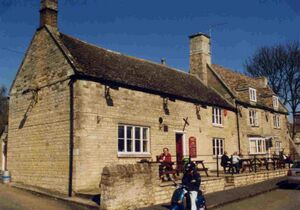Barrowden Brewing Co
Barrowden Brewing Co, Exeter Arms, 28 Main Street, Barrowden, Rutland
Established in 1998 as the Blencowe Brewing Co, using plant from the former Scanlon's Brewery (Middlesex).
Name changed to Barrowden Brewing Co following sale in 2005.
The seventeenth century pub is named after the Marquis of Exeter of nearby Burghley House and a local landowner. The outbuildings had previously been a brewhouse. From 1835 to 1870, in addition to running the pub John Bates was a maltster, suggesting that he was brewing.
The two-barrel plant for the new brewery came from the former Scanlon’s Brewery in Middlesex, and is located in the pub barn. Peter Blencowe after three years in planning, founded the brewery in June 1998. After taking a Brewlab course at Sunderland, he also received training from Rob Jones of the Dark Star Brewery and originally at the Pitfield Brewery, London.
Brewing takes place once a week, with most of the output going into the pub. The brewing liquor is mains water which has been “Burtonised”. The malts used include:- Crystal, Pale, Chocolate and Cara, with some wheat for head retention. The wort is boiled with hops being added three times. The hops used being Target, Challenger and Cascade. Fermentation takes some six days.
Initially the beer was called John Arnold, with a gravity of 3.8%, taking its name from a former vinegar factory in the village. However, the beers now available are as follows:- Boys 3.6% Big Boys 4.5% Young Boys 4.1% Strong Boys 5%
The latter beer has flavour reminiscent of another local beer from the County! There are also special brews, including Choir Boy (5.2%) made with Drambuie and mincemeat for Christmas.
The Rutland Local History Society booklet describes how once there were three “brewhouses” in the village. One was operated by William Swan on the east side of the green behind Stubbs the wheelwright (in 1979 a garage). Another one was William Dexter’s at Nob Hall, down Mill Lane. The third was operated by Masons at West Farm, with maltings opposite. There are no listings for these concerns operating on a commercial basis, so one must assume that they were probably farm based operations to supply their own workforces.

